
I have been away from this blog for more than a month, and before that I was posting infrequently. What I was doing, in retrospect, was waiting for a moment of relevance.
I found it with a man who died nearly 80 years ago.
Meet Alfred F. Oberjuerge, the grandfather I never knew.
He and I share something significant beyond DNA: Living through a time of pandemic.
A global virus, the Spanish flu of 1917-1919, nearly killed Alfred at the age of 28, shortly after he had joined the U.S. Navy. He narrowly avoided becoming one of the estimated 650,000 Americans to die from the flu — 10 times the U.S. combat death toll in World War I, which ended in November, 2018.
Alfred survived the flu pandemic, but he was not the same man, afterward. The flu had taken an unseen toll and he fell ill nearly every year for the final two decades of his life.
He was born in St. Louis in 1890, the fourth of six children (and third son) of Charles and Wilhelmina Oberjuerge.
The family was part of the second or third generation of ethnic Germans whose predecessors flocked to America in the second half of the 19th century. Many headed up the Mississippi River, settling in and around St. Louis.
“Farmer†was the most common job description in St. Louis, and the Oberjuerge family was no exception. Alfred’s father, Charles, was a truck farmer, who grew fruits and vegetables on his own land, then distributed them to nearby consumers. We can imagine young Alfred as a helping hand, in the first decade of the 20th century; he is not known to have attended high school.
Then came 1917, when Alfred was overtaken by life-changing events.
First, in April, came President Woodrow Wilson’s successful push for the U.S. to enter World War I on the side of the Allies — Britain, France, Russia.
Second, in May, Congress passed the Selective Service Act of 1917 — a military draft — meant to enlarge the U.S. armed forces and ship hundreds of thousands of men to the combat zones in France.
The third big change came on October 25, when Alfred married Laura Hanning, whose family joined his in attending Ebenezer Lutheran Church, in St. Louis. Alfred and Laura must have known each other from a young age; each was born in 1890, and each attended Ebenezer Lutheran School.
The next event in his life was his joining the Navy, on June 8, 1918, five months before the war ended. After training for perhaps two or three months, in Chicago, Alfred was sent to Naval Station Bremerton, near Seattle.
He wrote to his family that he was waiting to “ship out†from Bremerton.
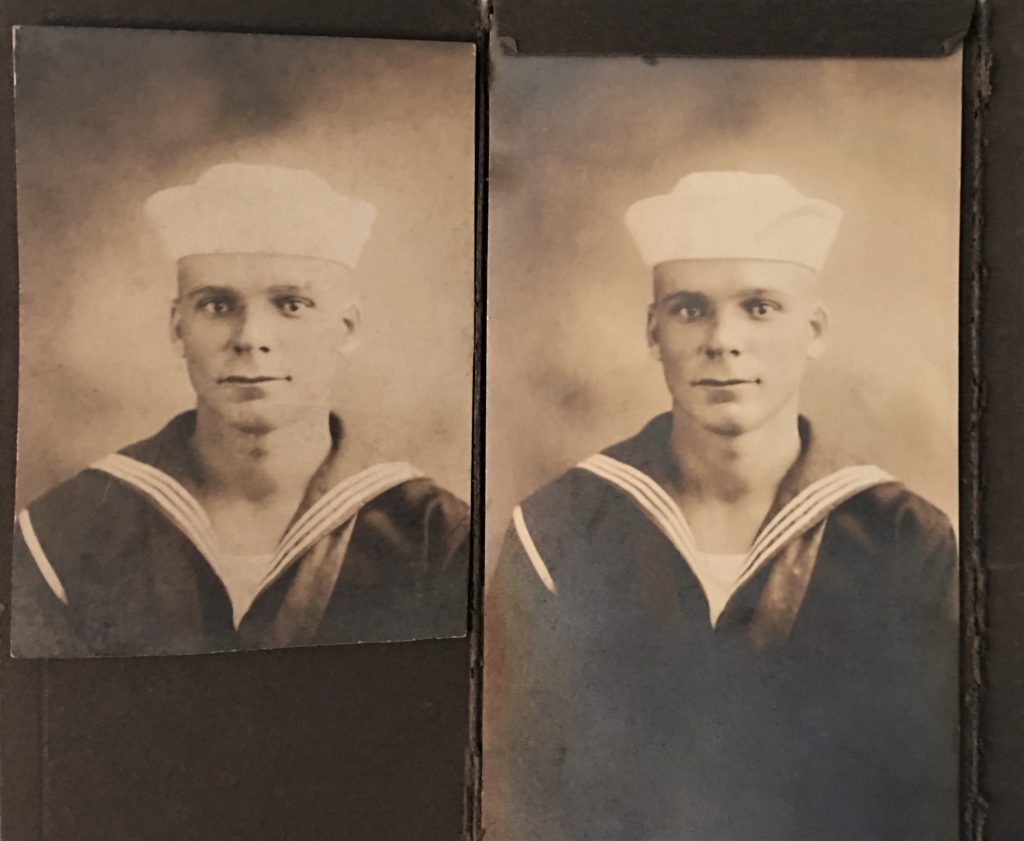
The 1917 draft called on all men from age 21 to 30 to enroll in a system that took into account dependent wives and children, during the selection process.
More dependents at home, less likely drafted for war. Alfred had a wife but he did not yet have children, and that presumably put him somewhere high on the list of men eligible for the draft.
It is not clear if Alfred was one of the 2.8 million American men drafted for military service, or one of the 2 million who volunteered.
When he was fit for duty (and he was not discharged until September 30, 1921), he apparently made a good impression, advancing from Seaman 3rd Class to Seaman 2nd Class, as indicated by a single lanyard over his right shoulder — which can be seen in the close-up photos.
Then the Spanish flu intervened.
Turns out, Alfred’s wait at Naval Station Bremerton left him in a very bad place at a very bad time, as the pandemic swept over the area.
Military encampments, with hundreds or thousands of men in close quarters, often become hot spots for passing along diseases like the flu virus — in this case, the deadly H1N1 strain.
In September of 1918, Bremerton and the Seattle area were about to be staggered by the arrival of what MYNorthwest.com described as “a trainload of sailor cadets†who had begun a cross-country journey a few days before in the city of Philadelphia, which eventually was to become notorious for having more Spanish flu deaths than any city in the country — more than 15,000.
Alfred never shipped out. By October, the flu was overwhelming the Bremerton base, with medical science even more helpless than it is now, in the time of the Coronavirus.
Alfred contracted the virus. He fought for his life and won that battle, but 63 of his Bremerton shipmates did not, according to MYNorthwest.
And Alfred was never quite whole again; the damage done during his life-and-death struggle left him susceptible to sickness year after year for the remaining two decades of his life.
He went to the hospital for the last time on March 31, 1940, with his wife riding along in the ambulance, according to Norma Courvoisier, 95, their surviving daughter.
He fought to survive, as can be determined by noting his 55 days in the hospital before he died, on May 24, at age 50.
“Cause of death†on the official certificate was a list of serious conditions. His doctor, C.W. Hughes, observed “Hypertensive and coronary arterio-sclerotic heart disease, with cardiac enlargement and myocardial insufficiency.â€
There was nothing much to be done, just as medical science could do little for him during the Spanish flu. Eighty years later, in a time of the Covid-19 virus, we now know how that goes. Overcrowded hospitals, infections seemingly everywhere, no vaccine. Tens of thousands of fatalities.
In 1940, according to the “statista†website, life expectancy for U.S. males was a tick over 60 years. It could be argued the Spanish flu took 10 years off Alfred’s life.
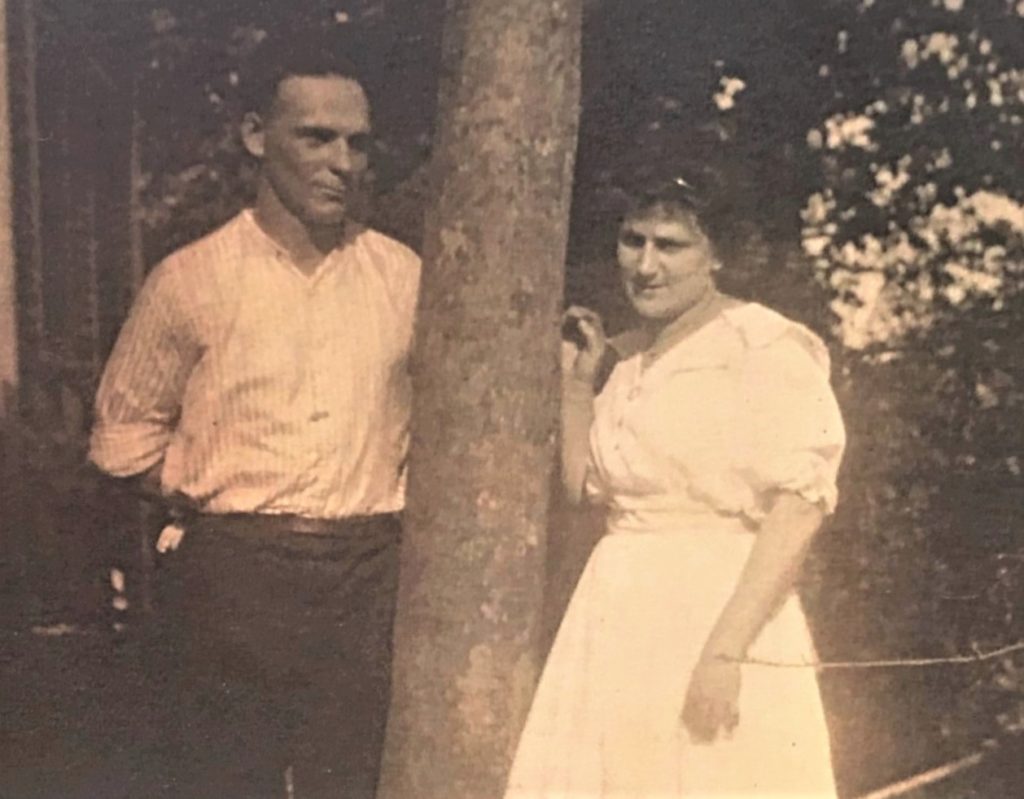
His death was a disaster for his family: two girls and 9-year-old son Alden, my father. Their breadwinner was dead and they would need the help of relatives to survive.
It also was a blow to the community. Alfred had been one of the three congregants who built a 1,700-square-foot school building for New Salem Lutheran School, the Jacksonville (Illinois) Daily Journal newspaper reported in January of 1931. He also was a member of the church’s board of education.
He was known for being adept in things mechanical, and his daughter Norma said “I don’t think there was anything he couldn’t do.†She remembers him adding a bedroom to their home in Jacksonville for when his father or his wife’s father would come to visit from St. Louis, some 90 miles away. “The grandpas’ room,†Norma said it was called.
Alfred had a reputation as a quiet but generous man. He practiced a more-focused sort of truck farming — he had a five-day-a-week route in which he delivered eggs and milk and staples like flour, sugar and rice. He also sold candy, some of which got into the hands of children at no charge.
In 1941, his widow, Laura, sold the Jacksonville house the family had lived in since 1928 and she moved to southern California, which was booming, joining her younger daughter, Norma, who was already in California.
Accompanying Laura on the long drive from Illinois (which featured many flat tires) were her sister, Ida, her son Alden and daughter Ethel, 21, who was the only member of the traveling party with a driver’s license.
Somewhere along the way, Alfred Oberjuerge seemed to become something of a forgotten man, through no fault of anyone in particular.
I was close to my grandmother Laura, who lived until 1966. We sat up late on many Friday nights at her house, watching roller derby, playing rummy and eating ice cream and talking politics. She was not fond of Democrats, no doubt in the context of World War I, Wilson, the draft, her husband and his near-death experience in Bremerton.
She never mentioned my grandfather, not that we should assume a long-widowed woman would broach the topic with a kid of 10 or 11.
I also do not recall my late father, Alden, talking about Alfred. My mother struggles to recall anecdotes featuring Alfred — no surprise given that she never met the man. But one that stuck in her head was this: Alden did not like to hear “Taps†played because it reminded him of his father’s funeral.
In large part, the shadow over Alfred is about the passage of time. My father was 9 when his father died; my mother never met Alfred, and he died before his daughters had married or any of his 11 grandchildren were born.
Still, I am embarrassed. For decades, all I could say about my paternal grandfather was this: He was in the Navy. He caught the flu. He was often sick. He died young.
It was the Covid-19 outbreak that set me off on a search for Alfred. He does not have much presence on the web: no surprise, given that he died in 1940. I received help from several of my first cousins who, like me, share 25 percent of our DNA with Alfred.
My aunt Norma can beat that — she is Alfred’s lone surviving child, a link to the past. Much of what we know about Alfred comes from her, casting her mind back nine decades.
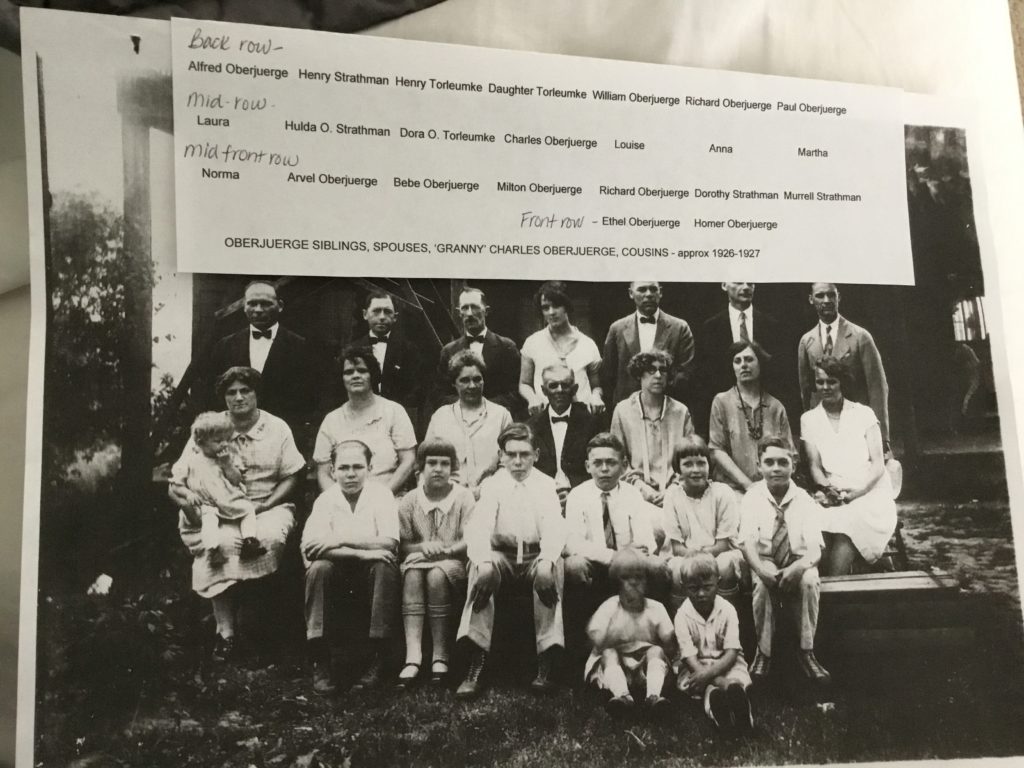
Thinking of his life, I find myself mulling the “ifsâ€. If Alfred had not joined the Navy in 1918 … if he had been sent somewhere other than Bremerton … if he had been two years older and unlikely to be drafted … if the Spanish flu had passed over him … it changes almost everything.
I wish I could speak to him about the flu and a worldwide epidemic. About the pain and fear and paranoia and the grim reality of daily life faced by those who suffered in the most lethal pandemic in U.S. history, so far.
I wish I had held his hand and gone to a ballgame. Or rode on his truck and asked him questions as he made deliveries.
He is buried at New Bethlehem Cemetery in St. Louis, with notice of his military service on his gravestone. I have made that pilgrimage and seen where he lays.
We can safely say this about him: He has 57 direct descendants who are alive today, none of whom would be on this mortal coil had Alfred not survived the Spanish flu a century ago.
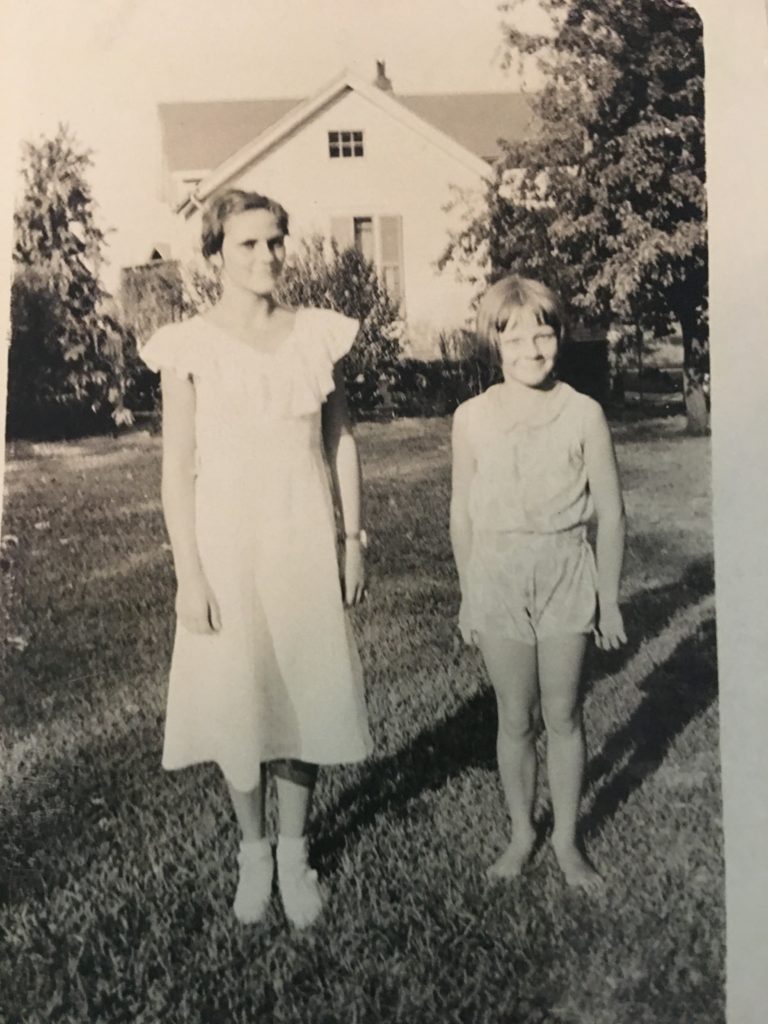
Interview with Norma Courvoisier, April 7, 2020.
With Jan Meredith, by Wes Courvoisier. Quotations from Norma Courvoisier, nee Oberjuerge.
Alfred Oberjuerge and Laura Hanning
St. Louis, Baden neighborhood
- The Oberjuerge and Hanning families were active members at Ebenezer Lutheran Church.
- Alfred and Laura were both born in in 1890 and attended Ebenezer Lutheran School.
- They were married on October 25, 1917, and lived in St. Louis. They married “late†for their era: Alfred was 27 and Laura was 26.
- Their daughters, Ethel (1921) and Norma (1925), were baptized at Ebenezer Lutheran Church. Alden (1930) was baptized at New Salem Lutheran Church in Jacksonville, IL
Jacksonville, Illinois
- The family moved to Jacksonville because Laura’s sister, Minnie, and brother-in-law, John, had a farm there.
- Uncle John and Alfred went on routes together to sell groceries, etc.
- Uncle John’s farm was on Sandusky Road which intersected with a street called Poor Farm Road — where a poorhouse was located.
- The family moved from the farm and bought a house at 302 W. Walnut, Jacksonville, where they lived from 1928 to 1941.
- Alfred was on the board of education at New Salem Lutheran School.
- Aunt Minnie and Uncle John had cows, horses, pigs and chickens on their farm.
- Alfred owned a Ford Model A car
- Alfred also owned a Ford Model A truck that he used to deliver goods using a different route each day
- The truck had two sides, one for dry goods and the other had a candy drawer. Norma and Ethel used to break in at night until their dad rigged it with a nail so they couldn’t open the drawer.
- Norma and Ethel bagged flour into five- and 10-pound bags, for sale on the route.
- The truck had four cages which contained eggs, live chickens, live geese, etc.
- Alfred would stop at a bakery to pick up soft bread (the farmers loved it and he always sold out).
Alfred’s death
- Every year Alfred suffered from the flu, which had nearly killed him in Bremerton in 1918.
- After falling ill the final time, he was hospitalized on March 31, 1940.
- Laura rode with him in the ambulance to the federal hospital, Jefferson-Barracks, in St. Louis, where he died on May 24, at the age of 50.
- Alfred’s funeral was held at Ebenezer Lutheran Church.
- He is buried in New Bethlehem Cemetery, St. Louis, near several family members.
Military Service
- Alfred entered the Navy on June 8, 1918, and was ordered to Naval Station Bremerton.
- He told his family that he was waiting to be shipped out.
- He caught the Spanish flu while in Bremerton, probably in October, after a “trainload†of sailor cadets arrived in the Seattle area, having come from Philadelphia — which was the hardest-hit city in the country with more than 15,000 flu deaths.
- Alfred was sent to the Bremerton Hospital where he nearly died.
- Eventually, he was released and sent home to St. Louis.
- He was discharged from the Navy on September 30, 1921, with the rank of Seaman 2nd Class in the USNRF.
Personal Traits
- Short-and-stocky build
- Good-natured, well-liked, a regular church-goer.
- Good sense of humor.
- At Christmastime he would put on a Santa face mask and peer in the window. His young son Alden (born 1930) “would get so scared!â€
- Very kind
- On his truck route, he gave children peppermint sticks and candy sticks.
- At home
- “He didn’t whip us as kids, so we must have been good.â€
- “I never heard him use cuss words.â€
- “We were probably the poorest family, but we had a lot of good times.â€
- “I can still see Dad sitting in the front yard holding Alden.†Q: How old was Alden? A: When he was “older than a baby.â€
- Good handyman
- Was one of three New Salem Lutheran Church congregants who built a 1,700-square-foot school house, from December 1930 to January 1931.
- Did a lot of building at the family home at 302 W. Walnut including:
- Cupboards and counters in the kitchen to “modernizeâ€.
- Built a room for Grandpa Oberjuerge and Grandpa Hanning to share when they retired. They both used it, but not at the same time. It was called “revolving grandpas.â€
- “ My Dad could do almost anything.â€
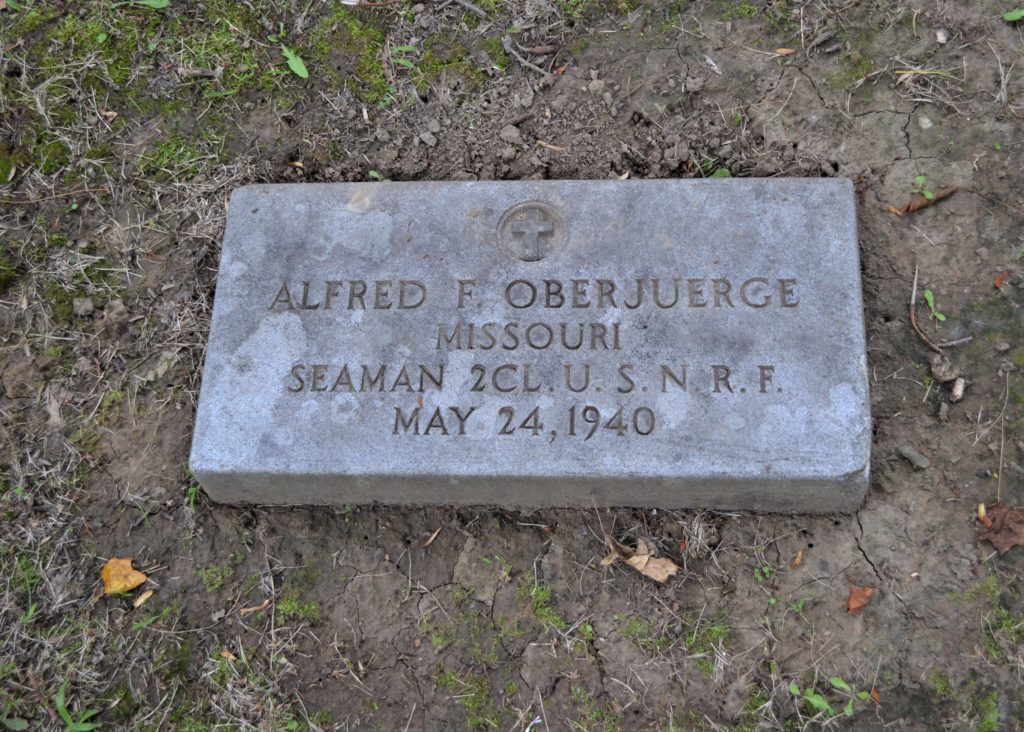
+

11 responses so far ↓
1 Laura Meredith // Apr 27, 2020 at 4:13 PM
Paul- I loved this article so much! Thank you for writing about him! I know Granny must have really enjoyed reliving her memories of the family by telling you. I look forward to reading this many times in the future x
2 Don Meredith // Apr 27, 2020 at 4:30 PM
Laura shared this link. This is a touching and-great account of your grandfather and family. All the best to you.
3 chick curtis // Apr 28, 2020 at 6:15 AM
I love stories about family histories. This one is very well done. Sad, but with a wash of quiet intimacy. Thank you
4 Myra Crookshanks // Apr 28, 2020 at 7:30 AM
What a great article Paul!! So many things I did not know.
I think I only knew his name and where they lived and that he married sort of late and that he was always in poor health and died young. Didn’t know he had had the Spanish flu. Hope you are doing well!
5 Shelley Patton // Apr 28, 2020 at 2:09 PM
Paul,
I also have a grandfather I never met. He too was sickly as a young man and passed away at a young age when my mother, his only daughter, was 12 years old (1943 or thereabouts) She said she was told he’d picked up some tropical “bug†while growing up in Hawaii and that his health was always precarious after that. Anyway, I, naturally, was drawn to your article and have come away with a new awareness of how little I know of him. Thank you for reawakening my desire to dig and ask questions to possibly in more of the blanks. I’m glad your grandad was such a fighter. Stay well.
Shelley
6 Myra Crookshanks // Apr 28, 2020 at 3:15 PM
Wow Paul! Such a great article. I knew very little about him. Basically that he married late, was always in poor health and died young. So happy I now know the rest of the story!! My girls loved reading this too. Sally thinks Ernie looks a lot like he does. The old pics were great too!
7 Cindy Robinson // Apr 29, 2020 at 9:10 AM
Great job pulling all the research together. Very interesting and a lesson for all of us to get our elders to speak of their history.
8 Elizabeth Boquet // Apr 30, 2020 at 7:29 AM
What a wonderful gift you’ve made for all of Alfred’s descendants!
9 Nate Ryan // Apr 30, 2020 at 4:44 PM
Wonderfully written and touching post, PaulO. A moment of relevance that we are extremely blessed to enjoy. Thanks for sharing it.
10 Cheryl Taylor Garner // May 2, 2020 at 4:06 PM
Thank you, Grandma Ethel always talked about great grandma Laura, but rarely spoke of her father, not that I asked, just seemed like it was easier. This is a great piece and so beautifully written and timely.
11 Chuck Hickey // May 25, 2020 at 9:30 AM
Tremendous article and very moving.
Leave a Comment